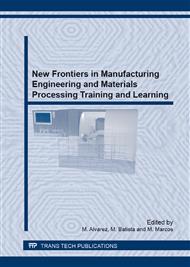[1]
M. J. Prince, R. M. Felder, R. Brent, Does Faculty Research Improve Undergraduate Teaching? An Analysis of Existing and Potential Synergies, Journal of Engineering Education, 96(4) (2007) 283-294.
DOI: 10.1002/j.2168-9830.2007.tb00939.x
Google Scholar
[2]
A. Rolstadås, S. Dolinšek, Global Education in Manufacturing: Basic Framework, Industrial Survey and Possible Implementation, Managing Global Transitions, 4(3) (2006) 261–278.
Google Scholar
[3]
L. Mears, M. Omar, T. R. Kurfess, Automotive engineering curriculum development: case study for Clemson University, J Intell Manuf, 2(5) (2011) 693-708.
DOI: 10.1007/s10845-009-0329-z
Google Scholar
[4]
G. Augusti, Accreditation of engineering programmes: European perspectives and challenges in a global context, European Journal of Engineering Education, 32(3) (2007) 273–283.
DOI: 10.1080/03043790701276742
Google Scholar
[5]
F. J. Ramírez, R. Domingo, M. A. Sebastián, M. S. Packianather, The development of competencies in manufacturing engineering by means of a deep-drawing tool, J Intell Manuf, (2011)
DOI: 10.1007/s10845-011-0575-8
Google Scholar
[6]
A. M. Paci, C. Lalle, M. S. Chiacchio, Knowledge Management for Open Innovation: Collaborative Mapping of Needs and Competencies, Journal of Knowledge Management Practice, 11(1) (2010), 30-39.
Google Scholar
[7]
P. Fernández, B. Álvarez, D. Blanco, E. Cuesta, S. Mateos, Development of a Virtual Machine for the Sheet Metal Bending Process Simulation for Educational Purposes, Materials Science Forum, 693 (2011), 16-23.
DOI: 10.4028/www.scientific.net/msf.692.16
Google Scholar
[8]
A. Sanz, I. González, A. J. Castejón, J. L. Casado, Using Virtual Reality in the Teaching of Manufacturing Processes with Material Removal in CNC Machine-Tools, Materials Science Forum, 693 (2011), 112-119.
DOI: 10.4028/www.scientific.net/msf.692.112
Google Scholar
[9]
E. García-Plaza, P. J. Núñez, A. R. Martín, E. Beamud, Virtual Machining Applied to the Teaching of Manufacturing Technology, Materials Science Forum, 693 (2011), 120-127.
DOI: 10.4028/www.scientific.net/msf.692.120
Google Scholar
[10]
L. Sevilla, M. J. Martín, F. Martín, Integration of Virtual Manufacturing Laboratory of the University of Malaga, Materials Science Forum, 693 (2011), 65- 3.
DOI: 10.4028/www.scientific.net/msf.692.65
Google Scholar
[11]
IUED, Map of generic skills of UNED (Mapa de competencias genéricas de la UNED) (In Spanish). IUED, UNED, Madrid, 2009. On http://www.uned.es
DOI: 10.36006/09524-4
Google Scholar
[12]
A. Sánchez-Elvira, E. Luque, F. C. García, M. A. López-González, M. V. Fernández-Sánchez, C. de Santiago, From design to generic skills assessment: Empirical analysis and intervention by rubrics (Del diseño a la evaluación en competencias genéricas: Análisis empírico e intervención mediante rúbricas) (In Spanish), UNED, Madrid, 2010. On http://www.uned.es
DOI: 10.4995/redu.2010.6217
Google Scholar


